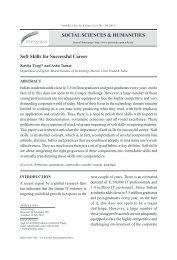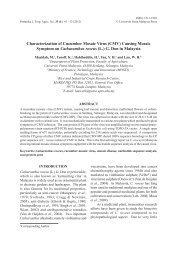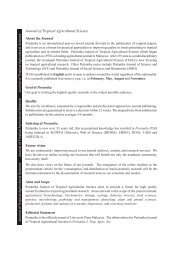JST Vol. 21 (1) Jan. 2013 - Pertanika Journal - Universiti Putra ...
JST Vol. 21 (1) Jan. 2013 - Pertanika Journal - Universiti Putra ...
JST Vol. 21 (1) Jan. 2013 - Pertanika Journal - Universiti Putra ...
Create successful ePaper yourself
Turn your PDF publications into a flip-book with our unique Google optimized e-Paper software.
ISSN: 0128-7680 © <strong>2013</strong> <strong>Universiti</strong> <strong>Putra</strong> Malaysia Press.<br />
<strong>Pertanika</strong> J. Sci. & Technol. <strong>21</strong> (1): 183 - 192 (<strong>2013</strong>)<br />
SCIENCE & TECHNOLOGY<br />
<strong>Journal</strong> homepage: http://www.pertanika.upm.edu.my/<br />
Issues on Trust Management in Wireless Environment<br />
Abubakr Sirageldin*, Baharum Baharudin and Low Tang Jung<br />
Computer and Information Science Department, University Technology Petronas, Bandar Seri Iskandar,<br />
31750 Tronoh, Perak, Malaysia<br />
ABSTRACT<br />
Developing a trust management scheme in mobile computing environment is increasingly important,<br />
and the effective trust management model is a challenging task. Business, education, military, and<br />
entertainment have motivated the growth of ubiquitous and pervasive computing environments, which<br />
are always available due to the widespread of portable and embedded devices. Wireless and mobile<br />
computing are good example of ubiquitous and pervasive computing environments. Due to the uncertainty<br />
and mobility in such environments, the issue of trust has been regarded as an important security problem.<br />
Malicious nodes are a major threat to these networks; the trust system can monitor the behaviour of<br />
nodes and accordingly rewards well-behaved nodes and punishes misbehaving ones. At present, there<br />
are a lot of endeavours on the trust model of the pervasive computing environment. In this paper, a trust<br />
management framework for mobile computing is presented. The hybrid framework is based on a fusion<br />
of the support vector machine (SVM) and fuzzy logic system. From the results, it can be stated that the<br />
framework is effective, dynamic, lightweight, and applicable.<br />
Keywords: Trust management, support vector machine, fuzzy logic, membership, interaction, pervasive,<br />
recommendation, central node, relationship<br />
INTRODUCTION<br />
Due to the rapid growth in network and communication technology, and the widespread of various<br />
types of computing devices, and the constant availability of services, security, confidentiality<br />
and the reliability are required in such an environment. Devices interact, collect and transfer<br />
Article history:<br />
Received: 31 March 2012<br />
Accepted: 31 August 2012<br />
E-mail addresses:<br />
abubakrsirag@gmail.com (Abubakr Sirageldin),<br />
baharbh@petronas.com.my (Baharum Baharudin),<br />
lowtanjung@petronas.com.my (Low Tang Jung)<br />
*Corresponding Author<br />
information with simplicity, and minimal<br />
technical expertise without being previously<br />
introduced to each other. This necessitates a<br />
certain concept of security such as trust. In<br />
order to maintain a secure, dependable, and<br />
reliable environment, a smart security system<br />
without or with the least human participation is





